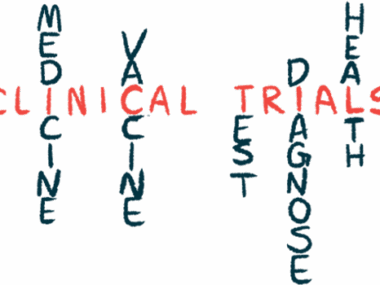Study backs efzofitimod as potential pulmonary sarcoidosis treatment
Therapy candidate being tested in Phase 3 trial; data expected by fall
Written by |

The findings of a new preclinical study in pulmonary sarcoidosis are lending support to the therapeutic potential of efzofitimod, a treatment candidate from Atyr Pharma now being tested in a Phase 3 clinical trial.
The researchers found that a protein called HARS-WHEP — whose activity is mimicked by efzofitimod — can reduce inflammation in pulmonary sarcoidosis by binding to a specific receptor on immune cells.
“These results validate a new way to approach immune regulation in chronic lung disease,” Paul Schimmel, PhD, the study’s senior author at Scripps Research Institute, said in an institute press release.
The study, “A human histidyl-tRNA synthetase splice variant therapeutic targets NRP2 to resolve lung inflammation and fibrosis,” was published in the journal Science Translational Medicine. The work was led by researchers at Atyr, Scripps, in California, and IAS HKUST-Scripps R&D Laboratory, in China.
The ongoing EFZO-FIT (NCT05415137) is testing efzofitimod in more than 250 people with pulmonary sarcoidosis. Top-line results are expected by fall.
Few treatment options now available for pulmonary sarcoidosis
Sarcoidosis is an inflammatory disorder marked by abnormal clumps of immune cells called granulomas. Pulmonary sarcoidosis, in which the disease affects the lungs, is a type of interstitial lung disease, or ILD — a broad category of disorders marked by inflammation and scarring, medically known as fibrosis, in the lungs.
Current treatment options for pulmonary sarcoidosis and other ILDs are limited, with the release noting that “no new treatments have been introduced in the past 70 years.”
HARS-WHEP belongs to a large class of molecules, called aminoacyl-tRNA synthetases, or aaRSs, that are involved in protein production in cells. However, its specific function has not previously been understood.
In this study, the researchers found that HARS-WHEP binds specifically to neuropilin-2, called NRP2, a receptor protein. NRP2 was found to be highly produced by macrophages, a type of immune cell, within tissues in response to inflammation. However, its function also was unclear.
Along with Schimmel, Leslie A. Nangle, PhD, Atyr’s vice president of research and the study’s first author, had screened more than 4,500 receptors. According to Nangle, the team had questions.
“We had a protein with an unknown function. We had a receptor that was doing something on immune cells that had never been characterized. So we had a couple things we had to match up,” Nangle said.
Further analyses showed that when HARS-WHEP binds to NRP2 on macrophages, it triggers the cells to transform, taking on anti-inflammatory properties.
“It’s creating a new type of macrophage that is less inflammatory and actually helps to resolve inflammation,” Nangle said.
Lab research suggests efzofitimod can lessen inflammation
In mouse models, treatment with a modified HARS-WHEP with improved activity in the blood was found to reduce lung inflammation, fibrosis, and infiltration of immune cells within tissues. These beneficial effects were seen not only in models of pulmonary sarcoidosis but also in models of other ILDs, namely pulmonary fibrosis and systemic scleroderma.
Atyr’s efzofitimod is a first-in-class therapy based on HARS-WHEP, mimicking its activity and subsequently activating the NRP2 receptor.
Data from an earlier Phase 1b/2a trial (NCT03824392) of efzofitimod suggested that the therapy candidate eased symptoms of pulmonary sarcoidosis. Analyses of immune cells from trial participants indicated that the therapy reduced the inflammatory activity of macrophages, consistent with the mechanisms shown in the study.
“In patients with sarcoidosis, efzofitimod treatment resulted in down-regulation of gene [activity] for inflammatory pathways in peripheral immune cells and stabilization of inflammatory biomarkers,” the researchers wrote.
Further, available data suggest that HARS-WHEP and efzofitimod can lessen inflammation without broadly suppressing the immune system.
Original work … gave rise to the idea that this could be a new class of therapeutic molecules. … We have now moved it all the way to clinical development. It’s a proof of concept for this whole class of molecules.
“It’s not a hammer; it’s not overly suppressing the immune system. It’s just nudging the immune system in a certain way,” Nangle said. “And if you can quiet the inflammation, you can stop the cycle of ongoing fibrosis.”
Atyr spun out of Schimmel’s lab, with Nangle, Schimmel’s former graduate student, as the first company employee.
“Original work that happened at Scripps gave rise to the idea that this could be a new class of therapeutic molecules,” Nangle said. “We have now moved it all the way to clinical development. It’s a proof of concept for this whole class of molecules and the work Paul has done.”
The ongoing Phase 3 EFZO-FIT trial, testing efzofitimod against a placebo in 268 pulmonary sarcoidosis patients, is set to end by mid-year, with top-line data anticipated by September. Its main outcome analysis was recently aligned between Atyr and the U.S. Food and Drug Administration.







